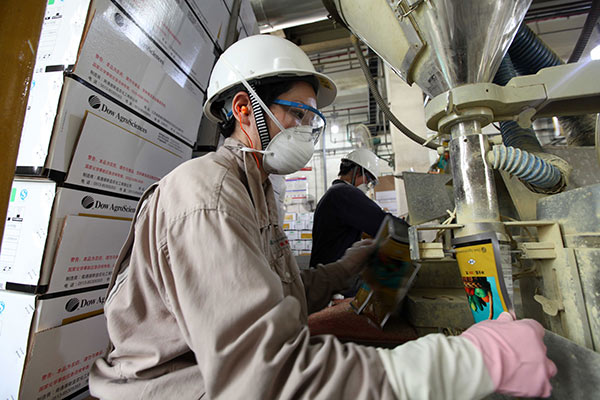Dow pins hopes on China's B&R

Workers package finished products at a plant of Dow AgroSciences, a wholly-owned subsidiary of Dow Chemical, in Nantong, Jiangsu province. Dow Chemical has hinged its growth prospects in China on the country's Belt and Road Initiative. HUANG ZHE/XINHUA
US company plans to start output from coating materials unit in Chengdu by 2018
Dow Chemical, the world's second largest chemical company, has hinged its growth prospects in China to the country's Belt and Road Initiative.
The initiative is attracting more and more foreign companies to follow the "go west" trend by opening plants and offices in inland regions and Dow does not want to be left behind. The US firm plans to start commercial production from its new unit in Chengdu, Sichuan province by the middle of next year, according to a top company official.
"Belt and Road is extremely exciting. It will open up new markets… And I think it will bring tremendous innovation, tremendous growth to the western part of China," Jim McIlvenny, president of Dow Asia-Pacific, told China Daily.
According to McIlvenny, the coating materials plant that is being set up in Chengdu will generate annual sales of 600 million yuan ($90.6 million), when in full capacity. In addition to the Chengdu plant, Dow is also evaluating other opportunities in the western regions.
"What is happening with the Belt and Road is that they are going to solve logistics issues, so we are putting the infrastructure in place. Economic development will automatically come," he said.
A report jointly published by Baker McKenzie and Silk Road Associates earlier stated that new Belt and Road Initiative-related projects could generate value of more than $350 billion over the next five years.
McIlvenny believes that the ongoing fourth industrial revolution would need the chemical industry to be more adaptive and innovative.
For example, Dow's cooperation with Chinese bicycle-sharing brand Mobike for developing a new innovative tire represents how rapidly the market is developing.
"If you and I were working on a new product development… 20 years ago in Dow, that process will take one to two years… we can often do in three weeks (now), and that is the speed companies like Mobike want to operate. Twelve months is a lifetime to them, and they want it in three weeks," said McIlvenny, adding that Dow has to change its processes and capability to get done what was needed to be done in a short time frame.
Dow's cooperation with Mobike started in November 2016 and the two sides developed and commercialized the polyurethane tire solutions in June. To date, the solution has already been used in about 2 million bikes.
According to Dow, compared to traditional polyurethane insert tires, the pure polyurethane solid tire solution helps reduce overall weight by up to 30 percent.
The sharing economy is taking shape in China by collaboration with a variety of businesses that range from shared bikes, shared power banks, shared cars, to shared books and shared gym capsules. The market size of the shared economy has surged 76.4 percent to 3.9 trillion yuan in 2016, said a report from China E-Commerce Research Center. Its promising outlook has attracted a wide range of enterprises and investment.
Dow's 600 scientists in its Shanghai R&D center are its largest team outside the US, and it has been doing global research in China for Dow around the world.
The company's China operations witnessed a volume growth of over 10 percent last year and China remained the US firm's second largest international market.


